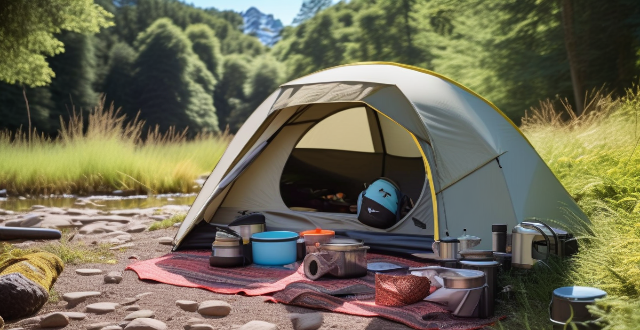Outdoor recreation activities like hiking, camping, fishingOutdoor recreation activities like hiking, camping, fishing a significant environmental impact if not Sustainable practices include choosing appropriate trails, packing out trash, using biodegradable soap, avoiding disturbing wildlife, choosing designated campsites, using reusable dishes and water bottles, using natural materials for kindling, hanging food and garbage away from animals, following fishing regulations, using barbless hooks and non-toxic lures, obtaining proper licenses and permits for hunting, and using non-toxic ammunition and bullets. By following these practices, we can minimize our impact on the environment and ensure that future generations can also enjoy the outdoors.

How to Minimize Your Environmental Impact While Enjoying the Outdoors
Introduction
Outdoor activities are a great way to enjoy nature and get some exercise. However, it's important to be mindful of our impact on the environment. In this article, we will discuss some ways to minimize your environmental impact while enjoying the outdoors.
Leave No Trace Principles
The Leave No Trace (LNT) principles are a set of guidelines that promote responsible outdoor recreation. Here are some key points:
* Plan ahead and prepare
* Travel and camp on durable surfaces
* Dispose of waste properly
* Leave what you find
* Minimize campfire impacts
* Respect wildlife
* Be considerate of other visitors
By following these principles, you can help protect the environment and ensure that future generations can also enjoy the outdoors.
Sustainable Practices for Outdoor Activities
Hiking and Backpacking
When hiking or backpacking, there are several sustainable practices you can follow:
* Choose trails that are appropriate for your skill level and avoid off-trail travel.
* Pack out all trash and dispose of it properly.
* Use biodegradable soap for washing dishes and bathing.
* Avoid disturbing wildlife by keeping a safe distance and not feeding them.
Camping
Camping is a popular outdoor activity, but it can have a significant impact on the environment if not done sustainably. Here are some tips for eco-friendly camping:
* Choose a designated campsite instead of creating a new one.
* Use reusable dishes, utensils, and water bottles instead of disposable ones.
* Use natural materials like leaves and sticks for kindling instead of chemical fire starters.
* Hang food and garbage away from animals using bear bags or hanging systems.
Fishing
Fishing can be an enjoyable outdoor activity, but it's important to do so sustainably:
* Follow local fishing regulations and only keep what you need.
* Use barbless hooks to reduce injury to fish.
* Avoid using lead weights and lures, which can harm aquatic life.
Hunting
Hunting can be a controversial topic, but if done responsibly, it can be part of sustainable outdoor activities:
* Obtain proper licenses and permits.
* Only hunt during designated seasons and within legal limits.
* Use non-toxic ammunition and bullets.
Conclusion
By following these sustainable practices for outdoor activities, we can minimize our impact on the environment and ensure that future generations can also enjoy the beauty of nature. Remember to always be mindful of your actions and their effects on the environment.